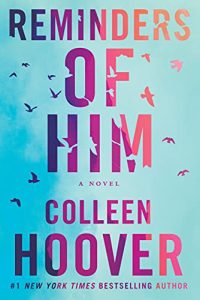
You know Colleen Hoover, the (in)famous author on BookTok, the book-loving sub-community of TikTok. If you’re not on TikTok, you probably still haven’t been able to escape seeing her books everywhere. They’re at Target, Barnes and Noble has whole tables dedicated just to her books, and every other social media is aflame with her books. So in a new series called “Taking Down Your Favorite Authors,” let’s talk about Hoover’s work and the trouble with it (the part about it being a new series may or may not be a joke).
Quick Overview of Hoover’s Work and Why People Like Her
Hoover writes almost exclusively romance fiction. Most of her work was self-published before she was picked up by a publishing house, and her most popular book, It Ends With Us (published in 2016), has sold nearly three million copies after getting noticed by TikTok users in 2021. So what's up with the Colleen Hoover hype? In a Reddit thread with that exact title, users said that they liked Colleen Hoover's work because it was undemanding, accessible reading. She doesn't use flowery language, her books are fairly short, making them easy reads, even if the topics themselves aren't supposed to be. One user said that because they're so short and easy to complete, that the feeling of accomplishment upon finishing the book inspired them to read more after a couple of years of reading drought. Another user said that the tropes that are throughout Hoover's books made them comfortable and familiar, like hot-guy-from-your-past-resurfaces or one-who-got-away-finds-out-you're-being-mistreated-and-wants-to-save-you.
So what’s wrong with her books?
Before we sojourn into what’s problematic about her work, let’s be very clear that it’s not because she writes romance novels. Romance novels are not inherently problematic and can be fulfilling reads, exploring human emotions and complicated situations.
That out of the way and said, Hoover’s female protagonists, however, are often depicted as lacking agency and being dependent on men. The women also experience levels of abuse and power inequality and reflect on it almost wistfully instead of calling attention to the moral shortcomings of their actions. In Reminders of Him, for instance, Kenna has just been released from prison and very early in the novel (less than 15 pages in), speaks about a prison guard pushing her up against the wall and kissing her. She doesn’t see a problem with this, other than she didn’t really want to kiss him, but decided to kiss him back as a “thank you” for “being kind to her.” The only reference that implies this action is unethical is that they were “found out” and the guard was transferred. Maybe I'm a stickler, but I think it's important to point out that Federal law criminalizes all sexual contact between guards and prisoners, so this somewhat throwaway admission is a little yikes. It would be easy to overlook, too, if there wasn’t other evidence of Hoover handling heavy issues indelicately.
In January of this year, Hoover announced that there would be a coloring book for It Ends With Us. If you’re not aware, It Ends With Us is a novel about an abusive relationship, and the male protagonist, Ryle, is described as a tortured soul and his redemption is through loving Lily, the female protagonist. After backlash of the tone-deaf nature of having a coloring book based on an abusive relationship, to her credit, Hoover canceled the coloring book. I bring this up not to shame her for a past mistake, but because I think it’s important to point out that because she thought making a coloring book about a toxic, abusive relationship wasn’t a bad idea in the first place that, perhaps, she is not equipped to deal with these issues in the nuanced way they deserve, especially considering her demographic is largely young women.
Criticism online is mostly concerned with that issue: Hoover’s fanbase is at an impressionable age, and her writing doesn’t skew toward condemning abusive relationships as much as it would be hoped. One blog I read said that they had seen a large amount of readers saying they felt that Lily had the abuse coming, which is particularly alarming.
It can be argued that since It Ends With Us is not the only novel to feature abuse in a relationship, that to some extent Hoover is romanticizing abuse (it’s me. I’m making that argument). At the end of It Ends With Us [SPOILER ALERT], Lilly and Ryle have divorced and are now co-parenting. Jennie Young for Ms. Magazine points out that this is “a blatant shirking of the barest parental responsibility—the responsibility to protect her daughter.” Ryle had been shown to have a history of manipulating women while being a violent sex offender. By choosing to write a happy-for-now-because-they’re-not-together ending, instead of Ryle facing consequences for his actions, it’s further evidence that Hoover isn’t condemning the behavior.
Okay So Tell Me Something Good
I’m doing my due diligence, so let me tell you the flip side of things. Whatever your opinion of Hoover so far, she has revitalized the publishing industry and gotten people excited about reading. In fact, publishing numbers have continued to rise (my theory is that it’s because of BookTok). People who are excited about reading go out and read other books, which in this not-at-all-biased librarian’s opinion, is a good thing.
Likewise, the mania that young women are impressionable isn’t giving women any credit. I think it’s a big deal if the common theme is romanticizing abuse and wanting men to always be the strong support system, but let’s also not sell young women so short that they can’t figure out on their own what’s bad about these relationships. Some readers have said that they felt the way that Hoover’s protagonists handle abuse is a very realistic take on how abuse victims handle their situations, especially those that do not report. In the aforementioned Reddit thread, fans of Hoover even pointed out that they recognized (in their words!) that Hoover's writing was lazy and bland, so I think it's safe to say that we can't assume all of Hoover's fans are unaware.
What do you think? Tell me below!





Add a comment to: Colleen Hoover: A Critique of the BookTok Favorite